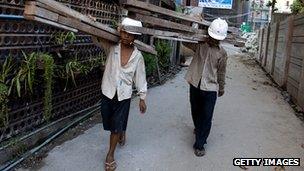EU plans to lift trade barriers for Burma exports
- Published

Burma's capital Rangoon is experiencing a construction boom
The European Union plans to further ease sanctions on Burma in response to a perceived improvement in the conditions of Burmese workers.
The EU Commission proposal - yet to be adopted by EU leaders - would open up EU markets for Burmese goods.
A ban on arms sales would remain.
The EU would remove tariffs and quotas, reinstating the Generalised System of Preferences (GSP). Burma lost GSP status in 1997 because of concern about forced labour.
Burma's exports to the EU totalled just 169m euros (£136m; $221m) in 2011, the Commission says - about 3% of the country's total exports to the world. Textiles formed the bulk of those exports to the EU.
In April the EU suspended sanctions against a large number of Burmese individuals and companies, in response to the country's political reforms. That suspension lasts until the next review, in April 2013, when it may be extended.
'Real economic support'
In a statement on Monday the EU Commission said its proposal to restore GSP status for Burma was based on an International Labour Organization (ILO) conclusion , externalthat the country had made "significant" progress in tackling forced labour.
GSP benefits 176 developing countries - the arrangement is also known as "Everything But Arms".
EU Trade Commissioner Karel De Gucht said that "since Myanmar/Burma started to open up earlier this year I saw the need to underpin such deep and important changes with real economic support once key improvements for the workforce had been met.
"Trade is fundamental to supporting political stability and the EU's trade preferences mean we will give this reform-minded country priority access to the world's largest market. That said, we will continue to engage with Myanmar/Burma to encourage continued progress on all fronts."
On Monday opposition groups said at least 58 political detainees had been freed in Burma - reportedly the last such prisoners, after hundreds were released earlier.
The EU is now considering its response to the latest releases, an official in the EU's diplomatic service told the BBC. Burma experts are trying to establish precise figures for prisoners, as estimates vary.